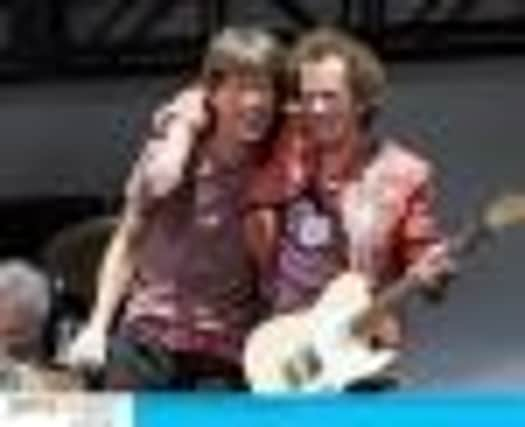Fiona McCade: Talkin’ ‘bout their generation gap


Alright, alright, maybe they’re slightly more popular than that. After all, someone’s happily buying their stuff after half a century and thanks to their dogged longevity, it’s possible for a young fan today to applaud with pleasure the same band (more or less) that his grandad applauded – with much the same pleasure – a lifetime ago. It’s pretty amazing when you think about it: In 1965, grandad, aged 20, goes to a sell-out gig and watches the Stones perform Get Off Of My Cloud, live. In 2012, his grandson, also aged 20, could also go to a sell-out Stones concert and watch them play that same song, live. (Well, as live as Keith Richards will ever be.) If the product is that durable, and continues to be that popular, I have no problem with it.
So why all the fuss about Englebert Humperdinck representing the UK in the Eurovision Song Contest? He may be 75, but he’s sold 150 million records and he can still croon with the best of them. He’s earned his showbiz stripes, so what’s so wrong with choosing a safe pair of hands to bring back the Eurovision prize?
Advertisement
Hide AdAdvertisement
Hide AdPeople who mock Humperdinck obviously don’t understand that Eurovision is not about parading our greatest talent; it’s about choosing a good singer who can win this famously cheesy competition. And since we’ve embarrassed ourselves hugely in the past, by fielding crass, bubbly, brain-dead twentysomethings, why shouldn’t we give a tried and tested old pro a chance?
Knee-jerk ageism is embarrassingly out of touch with the zeitgeist. The love of my life, Sir Paul McCartney (70 this year), regularly performs live to record-breaking crowds and still makes me happy by simply continuing to breathe in and out. Further down in the lower echelons of pop stardom, alongside Englebert and the Stones, you have Sir Tom Jones who is still going strong at 72, and was headlining in Las Vegas when he was 70.
The music business has always been kind to the elderly. Back in 1971, Clive Dunn had a No 1 hit with Grandad. Granted, he was only 51 at the time, but he was pretending to be 80 – and most people thought he was.
The thing is, if the music is good, the age of the performer shouldn’t matter. Do people buy Adele’s records because she’s 23? No, in fact, they buy her records despite the fact she’s 23. It’s her depth and maturity, which belie her tender years, which mark her out as so very special.
Of course, we’re talking about Eurovision here, so the music isn’t that good, but so long as there’s a seasoned performer in the driving seat, the very least we can expect is an effortlessly polished rendition.
When you consider that Ireland’s entry is (again) in the callow hands of Jedward, the choice of Englebert starts to look positively inspired. And although Humperdinck is the oldest-ever contestant in the competition, it’s important to remember that we’re not the only country to have called up its OAPs to do some more national service this year. Russia’s latest Eurovision entry consists of six very senior ladies (older than Englebert, I’ll wager) bouncing about in traditional dress and inviting us to a Party for Everybody. And it sounds like fun.
His Euro song may not be a timeless melody, but young Englebert deserves douze points for still being a household name. Like the Stones, he’s living proof that age means nothing, so long as you have the talent to keep working. In fact, a fair proportion of our most popular artists are past 40, so really, this shouldn’t be an issue.
Just to prove it isn’t, perhaps they should rename the Grammys the “Grannys”? After all, no rock star hopes they die before they get old, any more. There’s too much money to be made.